Best Practice: 1
Title of the Practice
Popularizing Science to Develop Scientific Temper and Critical Attitude
Objectives of the Practice
Generate interest in science, discuss cutting edge development in science and technology, inculcate curiosity in young minds, and propagate scientific literacy, in order to create global consciousness.
The Context
The need to perform scientific experiments as hands-on-activity, using easy to understand methodology to inculcate interest in science. The purpose is to ignite curiosity in young minds and to overcome fear and exploitation by dispelling superstition and blind faith.
The Practice
In spite of disrupted university schedules and overlapping academic terms, college has taken efforts to establish this practice. Science Forum was revived with the name of ‘Science Association- Curious Minds’. Major activities included formation of RYK-BIS standards Club, National and State Level Workshop seminars and workshops. Major events have been organised in collaboration with organisations like Chemical Research Society, Breau of Standardization, Infosys, ISRO and Dept National Remote Sensing Center. Science Day celebrations on college campus and field visits were conducted.
Events in 2022-2023
Conference/Seminar/Webinar/Workshop
- National Conference on ‘Challenges and Opportunities in Chemistry Research’ (18 & 19 September 2022)
- Webinar on ‘Bhuvan Overview’ in association with ISRO & Dept National Remote Sensing Center (28 & 30 September 2022)
- Workshop on ‘Fundamental Tools in Plant Systematics’ (2 & 3 March 2023)
- Workshop on PTTS sponsored by Infosys (17 to 20 March 2023)
Expert Lectures
- ‘Biodiversity’- Expert Mr. Abhijit Ghorpade (21 July 2022)
- Chemical Research Society Sponsored Lecture- Dr. Suvarn Kulkarni, IIT Mumbai (22 Aug 2022)
- Chemical Research Society Sponsored Lecture Dr. Jitendra Bera, IIT, Kanpur (22 Aug 2022)
- Chemical Research Society Sponsored Lecture Prof. Suhrit Ghosh, IACS (22 Aug 2022)
- Chemical Research Society Sponsored Lecture Prof. Subi George, JNCASR (22 Aug 2022)
- ‘Standardization and its Uses’- Expert Mr. Sameer Kumar (30 & 31 July 2022, 31 September 2022)
- ‘Machine Learning’- Expert Dr. Shirish Sane (22 November 2022)
- ‘Climate Change- Global Warming’- Expert Dr. D. P. Pawar (14 January 2023)
- Genesis Lecture Series- ‘3D Printing’- Mr. Mr. Akshay Deshpande (10 April 2023)
- Genesis Lecture Series – ‘Emerging New Crime’- Mr. Omkar Gandhe (10 April 2023)
- ‘Drone Technology’- Mr. Vishal Dharankar (10 April 2023)
Exhibition
- Socio- Scientific Exhibition organised by Science Association (08 April 2023)
Other Events
- Formation of RYK-BIS standards Club- 21 July 2022
- Documentary Screening on ‘Biodiversity in Anjeneri’ prepared by Dr. Sanjay Auti (Head, Dept. of Botany) – 21 July & 17 October 2022
Science Day Celebration (28 February 2023)
- Visit to Ashwamedh organised by Science Association
- Scientific Games and Physics organised by Dept. of Physics
- Scientific Quiz organised by Dept. of Microbiology
Celebration of other Days- Microbiology Day (13/9/2022), Geography Day (14/01/2023) Wetland Day (02/02/2023)
Physics Study Tour to Nehru Planetarium (09/03/2023)
Events in 2021-2022
Expert Lectures-
- ‘Scenario of Coastal Geomorphology in India’- Expert- Dr. Tushar Shitole (29/10/2021)
- ‘Glacial Processes’- Expert-Dr. Vina Joshi, SPPU (05/01/2022)
- ‘Intellectual Property Right’- Expert- Dr. Mrudula Bele (04/05/2022)
- ‘Research in Languages’- Expert- Dr. V. K. Avasthi (24/05/2022)
- ‘Biodiversity- Conservation and Challenges- Expert- Mr. Abhijit Ghorpade (21/7/2022)
- ‘Importance of Standardization’- Expert-Mr. Sameer kumar (30-31/07/2022)
Webinars
- ‘Research Tool’ Expert: Dr. Manju Dube (29/09/2021)-
- ‘Demystifying Career Opportunities in India’ : Expert-Mr. Nilesh Biniwale (28/02/2022)
Energy Swaraj Yatra for creating awareness about solar power- Resource Person: Prof Chetan Singh Solanki (IIT Mumbai) -18/12/2021
Two Day State Level Workshop on ‘Chemical Sciences’ in association with Royal Society of Chemistry organised on 12 & 13 April 2022. Dr. A. V. Borhade (Renowned Research Scientist), Dr. Avinash Kumbhar (Senior Academician, SPPU), Dr. Santosh Gharpure ( IIT, Mumbai), Dr. K. P. Kaliappan (IIT, Mumbai) and D. Prasenjeet Ghosh (IIT, Mumbai) were present as the resource persons.
Chemical Research Society of India sponsored Lecture Series was conducted for UG and PG students on 22/08/2022. Dr. Suvarn Kulkarni (IIT Mumbai), Dr. Jitendra Bera (IIT, Kanpur), Prof. Suhrit Ghosh, (IACS) and Prof. Subi George (JNCASR) conducted session on various topics of chemistry during this event. 180 students attended the sessions.
Screening of documentary on Anjaneri prepared by Dr. Sanjay Auti (Head, Dept. of Botany) was screened on 21/7/2022
Formation of RYK-BIS standards Club–
Visit to Grape Harvest Exhibition at MTDC Grape Park on 26-27/03/2022
Poster Competition: Theme: Role of Chemistry on 12/04/2022
Events in 2020-2021
Guest lectures organised-
- Kapil Natu on “Performance Management” (09/08/2020)
- Satish Gogate (GM, Mahindra) on ‘Modern Era Automation’ (27/09/2020)
- R. S. Tiwari on ‘Technologies for 2021’ (17/10/2020)
- Bipin Thakur on “A Roadmap Towards Getting Jobs in IT” (24/10/2020)
- Sunit Rane (CMET, Pune) on Developments of Electronic Material’ (02/01/2021)
- Omprakash Kulkarni on ‘Role of Physics in Medical Science’ (22/01/2021)
- Umesh Kakade (Govt. Institute of Science) on ‘Opportunities in Life Sciences’ (20/02/2021)
- K. P. Muthe and Dr. V. B. Channdratre (BARC, Mumbai) on ‘Career Opportunities in Physics’ (15/03/2021)
- Yogesh Kasat (Irvine, California) on “Introduction to ERP and Opportunities” (24/02/2021)
- Rahul Saraf on “building Cloud Enabled Software’ (25/01/2021)
- Mayur Kothawade (Quinbay, Banglore) on “The History and Future of Mobile Development” (26/01/2020)
‘Student Solar Ambassador Workshop’ organised at Nutan Vidyalaya at Guhi, Taluka Surgana on 07/02/2021 where students were given hands-on-training of solar lamp making along with awareness about energy conservation. 60 students participated. Our faculty interacted with the staff of the school and guided them about conduct of science-oriented activities. During ‘Botanica-2021’, on 09/02/2021 online experiments were shown to students. Other science related activities like Botanical arts, model /poster presentation, flower arrangement were also organised to boost scientific thinking. A skit, ‘Life Story of Albert Einstein’ presented by Physics students on the occasion on National Science Day. A study tour to Nehru Science Center, Mumbai was organised by Physics Dept. Dept. of Zoology organised photography competition on “LIFE AMID COVID” during 1 june to 10 june 2020.
Our faculty, Mr. Pravin Joshi participated in Solar Off-grid Entrepreneurship Training Program (16-03-2020 to 20-03-2020) organised by NCPRE, Govt. of India at IIT Bombay.
Evidence of Success
The beneficiaries of this Best Practice are manifold, including students, faculty on the campus as well as off the campus. Along with this, the research students, scholars have been benefited from these events. More than 200 students have been participated in the activities conducted under the banner of Science Association-‘Curious Minds’. The summer-camp is a popular activity and parents are eager to enrol their wards. This year due to Covid-19, this activity could not be materialised in the fullest way. However, in the given circumstances guest lectures are well attended with interactive participation. This year 60 students participated in solar making workshop. More than 2500 students attended the tribal area Science-camp till now. This year 253 students participated in Botanica festival and 360 students attended guest lectures conducted different dept. 85 students participated in visit to Science centre. 79 participants from all over India contributed 186 photographs in the Photo competition of Zology dept. (for more details https://docs.google.com/document/d/15ctRDRPpBfLM2_a0Uq4cNV2ZpQ1dpVW5/edit). All events were reported in newspapers. It was possible for college to reach out to students and society at large only by using technology even during pandemi//c situation.
Inauguration of the Socio-Scientific Exhibition (08/04/2023)
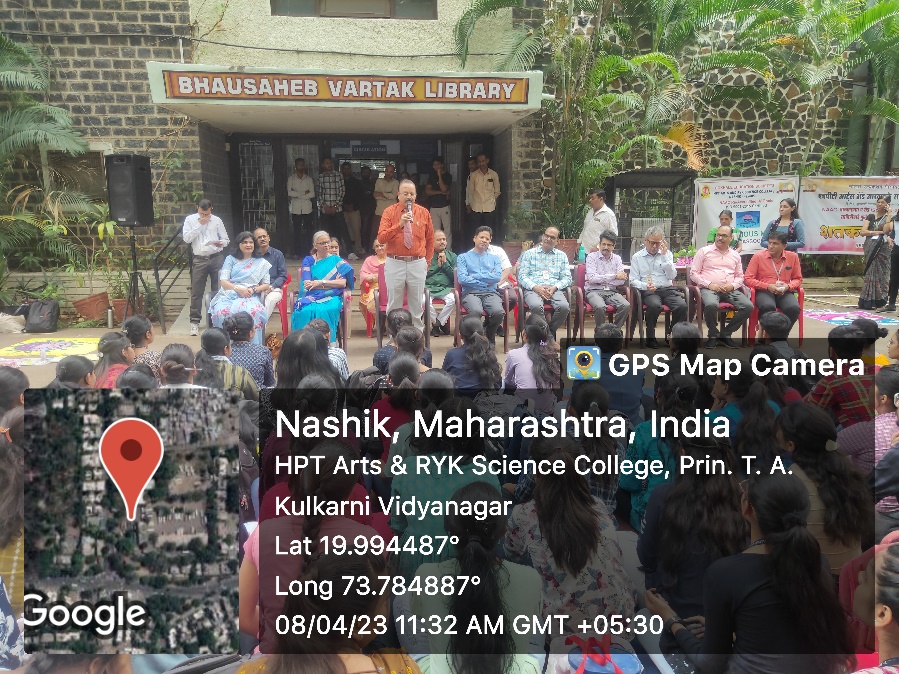
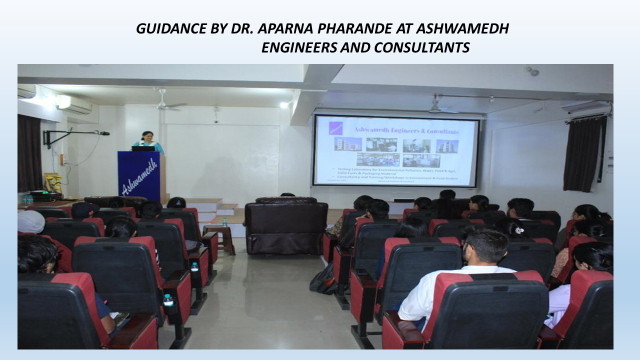
Visits to Labs
Flyers of the Events
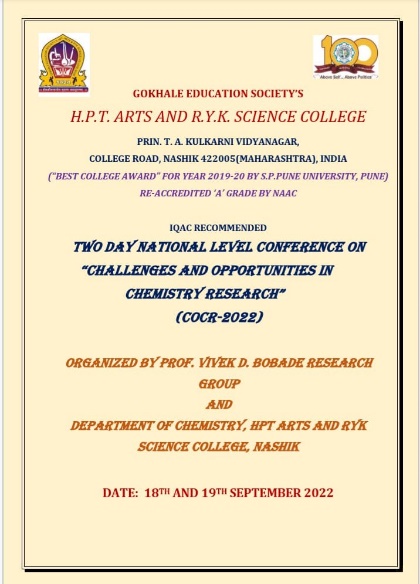

Two Day State Level Workshop on ‘Chemical Sciences’ : Prin. Dr. V. N. Suryavanshi giving introductory speech (12/04/2022)
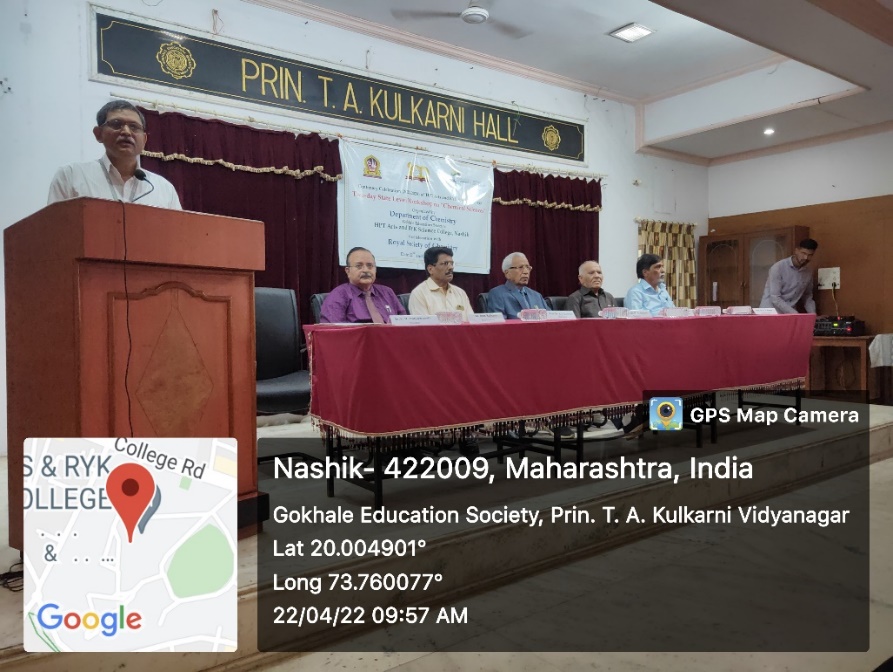
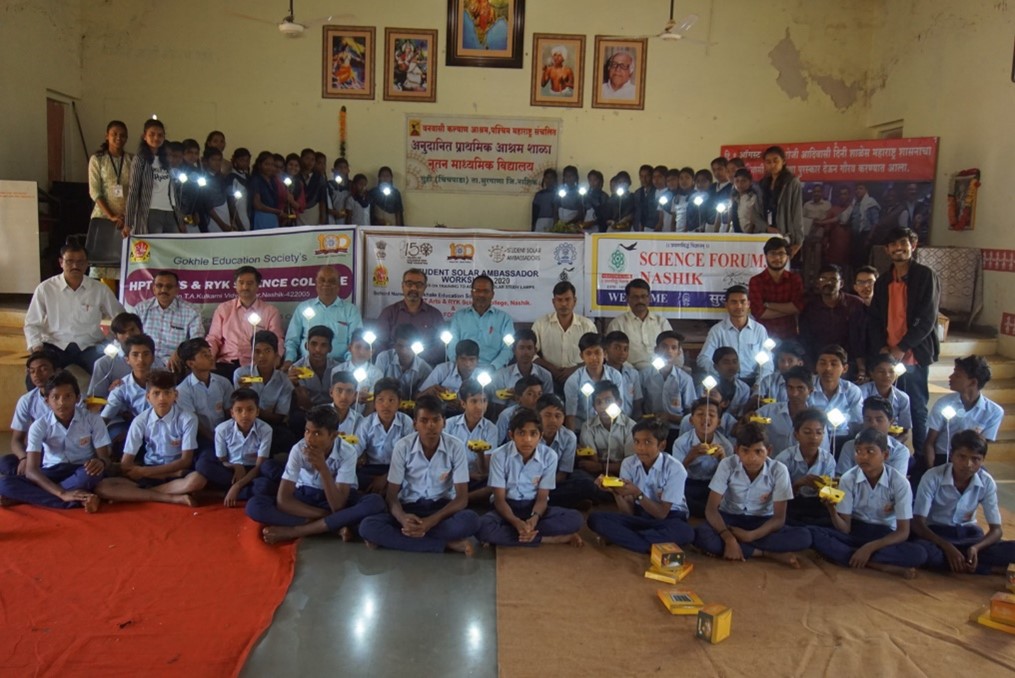 Student Solar Ambassador Workshop (07/02/2021)
Student Solar Ambassador Workshop (07/02/2021)
Problems Encountered and Resources Required
The impact of Covid-19 situation continued in the form of disrupted academic schedule was biggest hurdle for implementing these activities. During the covid-19 onslaught, most of the schools and college in Nashik city were closed. Hence, certain activities were conducted only in rural/tribal area. Traveling was difficult for students, faculty and experts. In the post-covid times, the college could not organise events, in spite of the willingness, due to rush of finishing syllabi and evaluation. To counter these issues, ICT and other media were used for impactful interactions. Physical seminars were replaced by webinars, regular posters/models gave way to digital modes. Online platforms like Zoom, Google Meet or even YouTube were frequently used to conduct these activities. Enthusiastic participation of students, school-children and teachers, even during the toughest time, was the real resource behind success of these programmes. Conducting these activities was a delightful engagement for teachers and students when things were dark and gloomy outside. These activities could create a positive impact on the stakeholders as well as organisers, proving college’s motto to find ‘Quest for Best.’
Notes
The practice directly addresses to two core values of NAAC namely fostering Global competencies among students and inculcating a value system among students. Scientific activities lead to the development of logical attitude and critical thinking, which can be the decisive competency to get recognition at the global levels. It also imbibes the spirit of research and inquiry among students right from the undergraduate days. Along with this, engagement of students in practical experiences, workshops, field visits, management of events are ensured through activities of Science Forum. Students are exposed to the world outside the classroom and knowledge outside the books. This aspect of experiential learning helps in the development of values like leadership, team work, conflict management, communication skills and industriousness. Thus, this practice takes care of NAAC core values. In addition, the NEP-2020 has emphasised on the revitalization of Scientific Temperament In India. UGC National Higher Education Qualification Framework (NHEQF) has categorically pointed out about developing Scientific thinking and Research Skills. The above practice adapted by the college aligns with the national polices.
Best Practice: 2
Celebrating Our Tradition
Title of the Practice
Celebrating Our Tradition
Objectives of the Practice
Inculcating Value System among Students by making them aware about Bhartiya Traditions
and knowledge system as well as rich cultural diversity, in order to create consciousness about national identity
The Context
H.P.T. Arts & R.Y.K. Science College, Nashik has a rich legacy of 100 years. The institutions has established itself as the epicentre of fostering culture, language and literature. The college used to have 12 language departments in the early years including Sanskrit, Arebic, and Farsi. Renowned Marathi writer and Dynanapeeth Awardee V. V. Shirwadkar alias Kusumagraj was our prestigious alumni. Prof. Vasant Kanetkar, a significant writer in Modern Marathi Drama arena was working here. Marathi and English scholars-critics like R. B. Patankar, Madhav Manohar and W. L. Kulkarni were our past students. The college is having four depts of languages, including Sanskrit, which is only Sanskrit dept. in the entire Nashik district. The college has 4500 manuscripts preserved over the years. Along with the college has contributed in many cultural and national events including the freedom struggle, Maharashtra Mukti Movement and Kalaram Satyagraha Movement. Nashik is a religious and cultural place since ancient times, well-known across the world for Sinhastha Kumbhmela.
On this backdrop, this practice holds great significance. It is necessary to keep new generation technologically updated but they should also be aware about their rich cultural past. With this thought in mind, the college has initiated more conscious efforts to introduce students to our cultural heritage by organising events related to Bharatiya Darshan (Philosophy), Bhartiya Knowledge System, History of Bharat, Bharatiya Literature and Shastra, Bharatiya Festivals along with celebration of local and indigenous culture.
The Practice
In spite of disrupted university schedules and overlapping academic terms, college has taken efforts to establish this practice. The events have been planned and put in the academic calendar. Major activities included workshops, seminars and guest lectures. Students were encouraged to organise musical or dance performance during major festivals. Major events have been organised in collaboration with organisations like. Short Term Courses on Prakrut, Sanskrit Grammar were conducted dedicated to this theme. Significant Days celebrations on college campus and field visits were conducted.
Events in 2022-2023
- Workshop/Seminars/Webinar
- Panel Discussion on Natyashastra (30/06/2022)
- Webinar on Indian Knowledge System (18/9/2022)- Expert Dr. Vina Kshirsagar
- Expert Lectures
- ‘Yoga for Sport Players’- Expert Dr. Minakshi Gawali (21/6/2022), Kalidas Din
- ‘Astrological References in Kalidas’s Writings’- Expert Dr. Dr. Vinay Joshi (2/7/2022)
- ‘Sanskrit, Sanskar and Sanskruti’- Expert Shri. Yadneshwar Das (13/8/2022)
- ‘Social Contribution of Dr. B. R. Ambedkar’- Expert Dr Alim Vakil (06/12/2022)
- ‘Marathi Bhasha and History’ – Expert Shri Hemant Tile (23/01/2023)
- ‘Battle of Panipat’- Expert Shri Narendra Patil (24/01/2023)
- ‘Marathi Bhasha Gaurav’ -Expert Shri Hemant Takle (27/02/2023)
- Mock Parliament- Celebrating Democratic Tradition of India (27/8/2022)- Chief Guest- Smt. Bharatitai Pawar, Union Minister,
- Ganesh Festival Celebration (1 to 4 September 2022) including Kirtan, Classical Dance, Devotional Songs presented by students
- Screening of Shortfilm- Yatharth- by Sir Dr. M. S. Gosavi on Independence Day (15/08/2022)
- Azadi ka Amrutmahotsava- Swarajya Celebration- Common Rashtragaan (17/08/2022)
- Book exhibition organised in collaboration with Vivekanand Center on Swami Vivekanand Jayanti (12/01/2023)
- Chandubai Kulkarni Elocution Competition (29/03/2023)
- Celebration of Days- Shiv Swarjya Din (6/6/2022), Kalidas Day, Lokmanya Tilak Death anniversary (1/8/2022), R K Narayan Birth Anniversary Celebration (10/10/2022), Vachan Prerana Din (15/10/2022), Mahaparinirvan Din (06/12/2022)
Events in 2021-2022
- Vasantostav- Tribute of Prof. Vasant Kanetkar during Centenary year of his birth- Cultural Programme included stagging of drama, poetry reading and expert lectures (21/03/2022)
Seminar/Workshop/Webinar
- Workshop on Indian Dramatics- Experts: Mr. Sunil Deshpande & Mr. Datta Patil (17/12/2021)
- Workshop on Mandala Art- Expert: Ms. Aditi Bhargave (25/04/2022)
- Webinar on Yog for All- Expert: Dr. Ramesh Warkhede (03/05/2022)
Expert Lectures
- ‘Swami Vivekananda: Youth and building New India’- Expert Dr. Narendra Deshmukh (12/01/2022)
- ‘Marathi Bhasha, Sahitya and Its Relevance’- Expert Dr. Vandana Mahajan (02/03/2022)
- ‘Bharatratna Dr. P. V. Kane- Life and Work’- Expert Dr. Shreenand Bapat (11/05/2022)
- Poetry Reading Competition (17/05/2022)
- LitFest- Festival showcasing skits, poetry readiing and performances based on literary texts- 20/05/2022
- Dr. Chandubai Kulkarni Elocution Competition (05/03/2022)
- Celebration of Days- Patrakar Din (06/01/2022), Swami Vivekananda Jayanti (12/01/2022), Savitribai Phule Abhivandan (14/02/2022), Shivaji Maharaj Jayanti (19/02/2022) Marathi Bhasha Gaurav Din (27/02/2022)
- Celebration of Ganesh Festival in college (31 August- 05 September 2022)
Evidence of Success
Students and Faculty of the college as well as from outside institutions were involved in carrying out this practice enthusiastically. Students not only from Arts stream but also from Science courses participated in events like Ganesh Festival, Poetry Reading, LitFest. Large number of students attended lectures, webinars and various competitions. Student on the campus and off the campus visited book exhibition. Teachers across depts have participated in all these activities. The cultural committee of the college is headed by a chemistry professor is an example of collaborative work. Around 300 audience was present for Mock Parliament and overall around 1800 students and faculty engaged and got benefited from the events organised under this practice.
Evidences
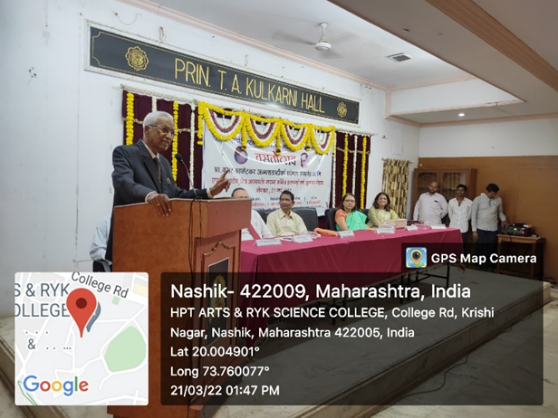
Vasantosav- Tribute to Prof. Vasant Kanetkar
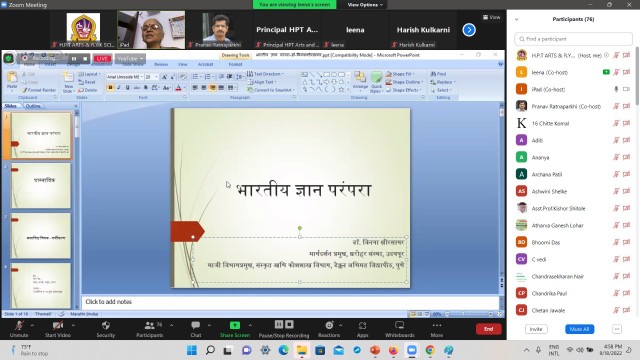
Expert Lecture on Bharatrana Dr. P. V. Kane Webinar on IKS
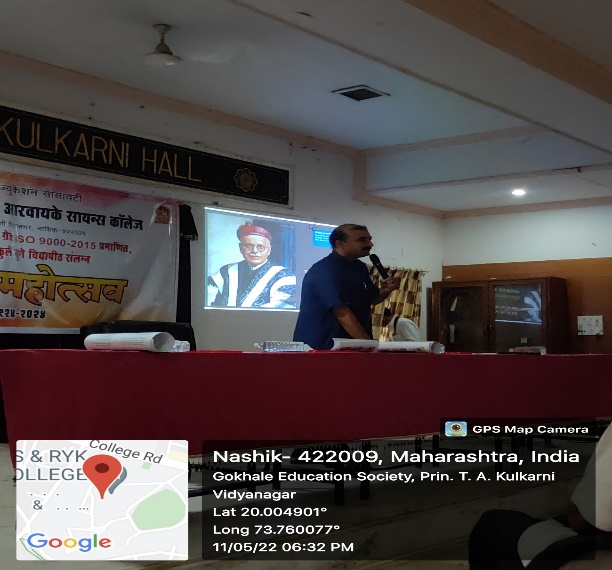

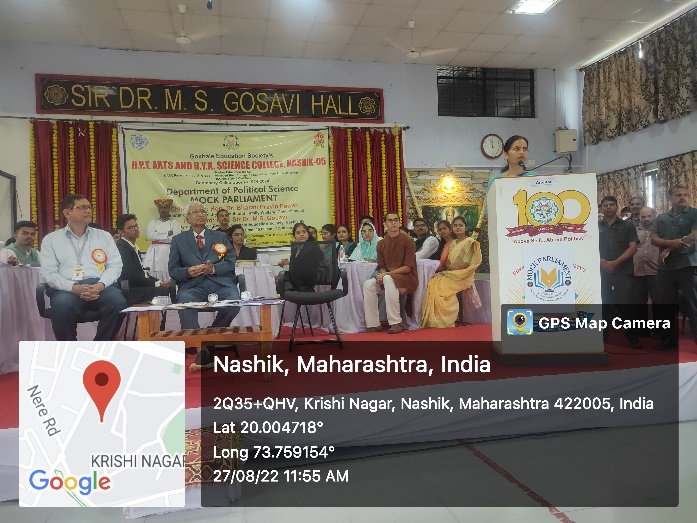
Mock Parliament LitFest
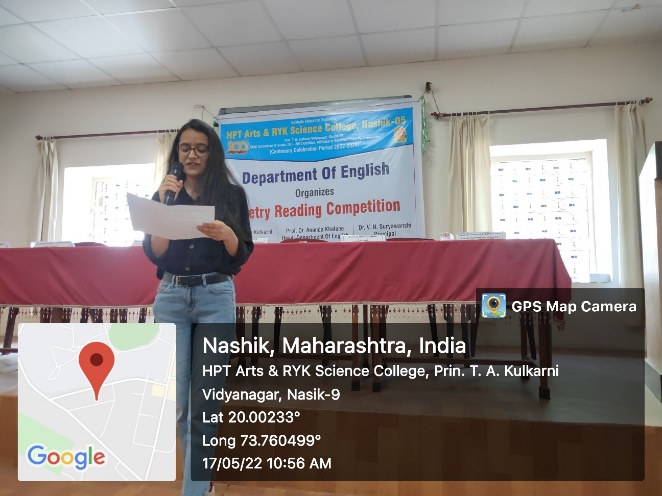
Poetry Reading Competition Ganesh Festival Celebration
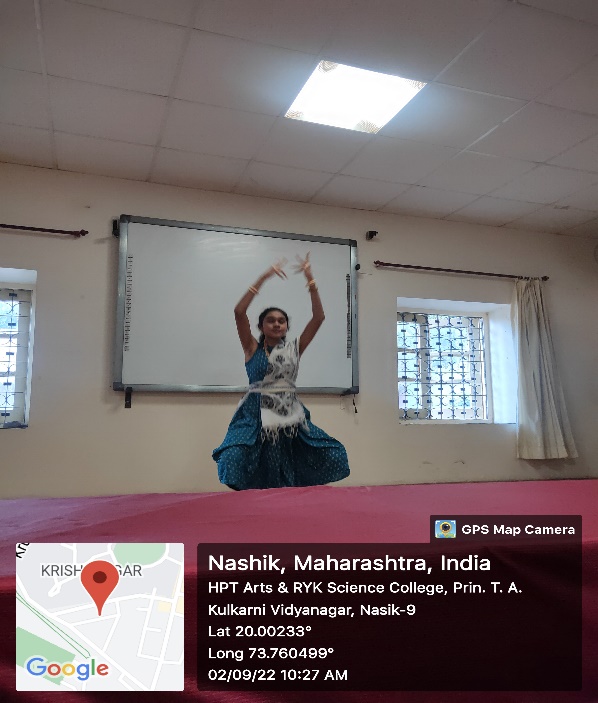
Flyers/Notices of the Events
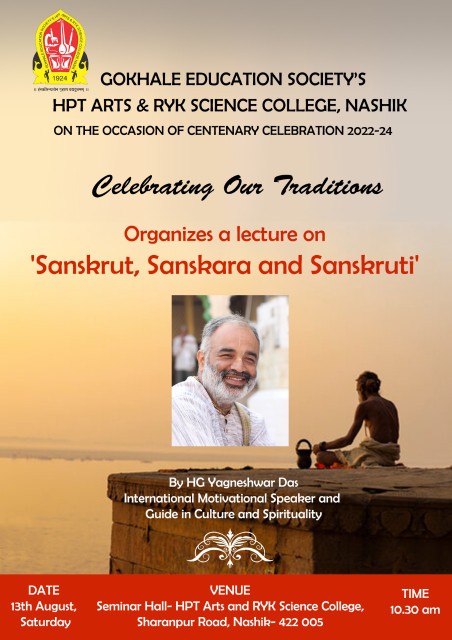
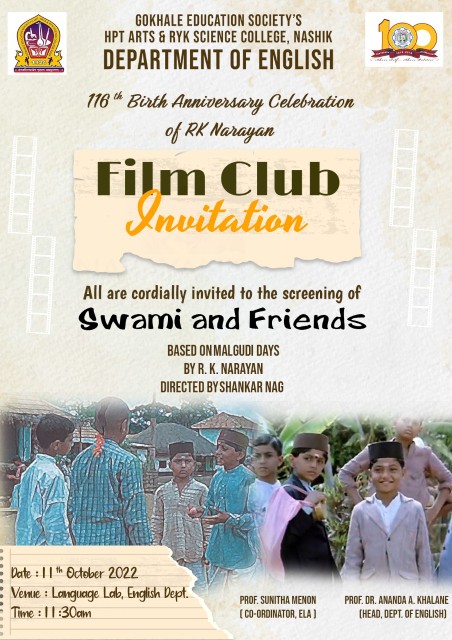

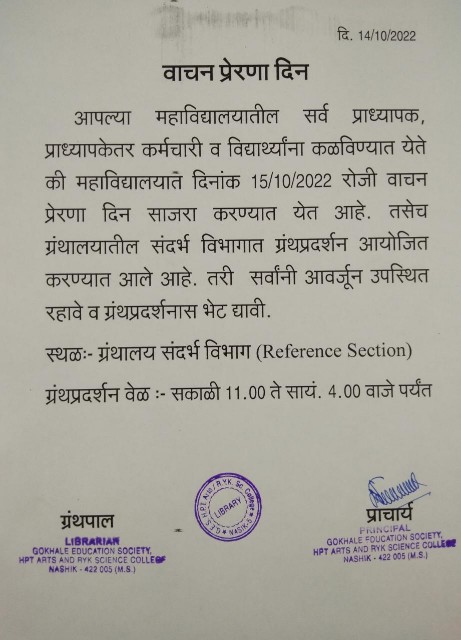
Notice regarding Book Exhibition on the occasion of Vachan Prerana Din
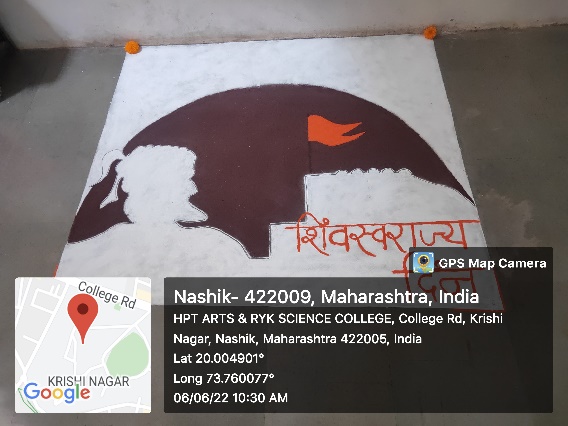

 Rangoli drawn by students for celebrating significant days
Rangoli drawn by students for celebrating significant days
Problems Encountered and Resources Required
The impact of Covid-19 situation continued in the form of disrupted academic schedule was biggest hurdle for implementing these activities. It was difficult to bring different students on one platform due to overlapping examinations, practicals and other academic activities. To counter these issues, ICT and other media were used for impactful interactions. Physical seminars were replaced by webinars, regular posters/models gave way to digital modes. Online platforms like Zoom, Google Meet or even YouTube were frequently used to conduct these activities. Enthusiastic participation of students, teachers, even during the toughest time, was the real resource behind success of these programmes. Sometimes the use of language like Sanskrit or philosophical/spiritual topics created the issue of comprehension for some students. However, the diligent resource persons and motivated faculty members made it a point to explain the points creatively. In the culturally rich like Nashik, there is no dearth of resources. Students were encouraged to explore cultural and historical places during their field and project work. Conducting these activities was a delightful engagement for teachers and students when things were dark and gloomy outside. These activities could create a positive impact on the stakeholders as well as organisers, proving college’s motto to find ‘Quest for Best.’
Notes
This practice is directly linked with the NAAC Core value, ‘Inculcating a Value System among Students’. Through introduction and exploration of their traditions, the students are made aware about the rich legacy of our country. While our coming generation should be aware about global scenario, they must be conscious about Indian philosophy, history, art, literature and knowledge systems. This would definitely help them to situate themselves in the global context, without carrying the colonial hangover in any form. NEP-2020 recommends the incorporation of Indian. Knowledge System (IKS) into the curriculum at all levels of education. This practice supports the rationale of NEP-2020. The 4500 manuscripts with college is a rich source of Bhartiya Knowledge and students of the college are exploring different dimensions of these manuscripts. This practice also hons different skills of students that are not generally considered in academic scenario like script writing, drafting bills for parliamentary discussions, stagging performances based on literary texts, fusion of eastern-western culture and translation across languages. These skills are going to play important role in the revamping structure of Higher Education after the implementation of NEP-2020.
